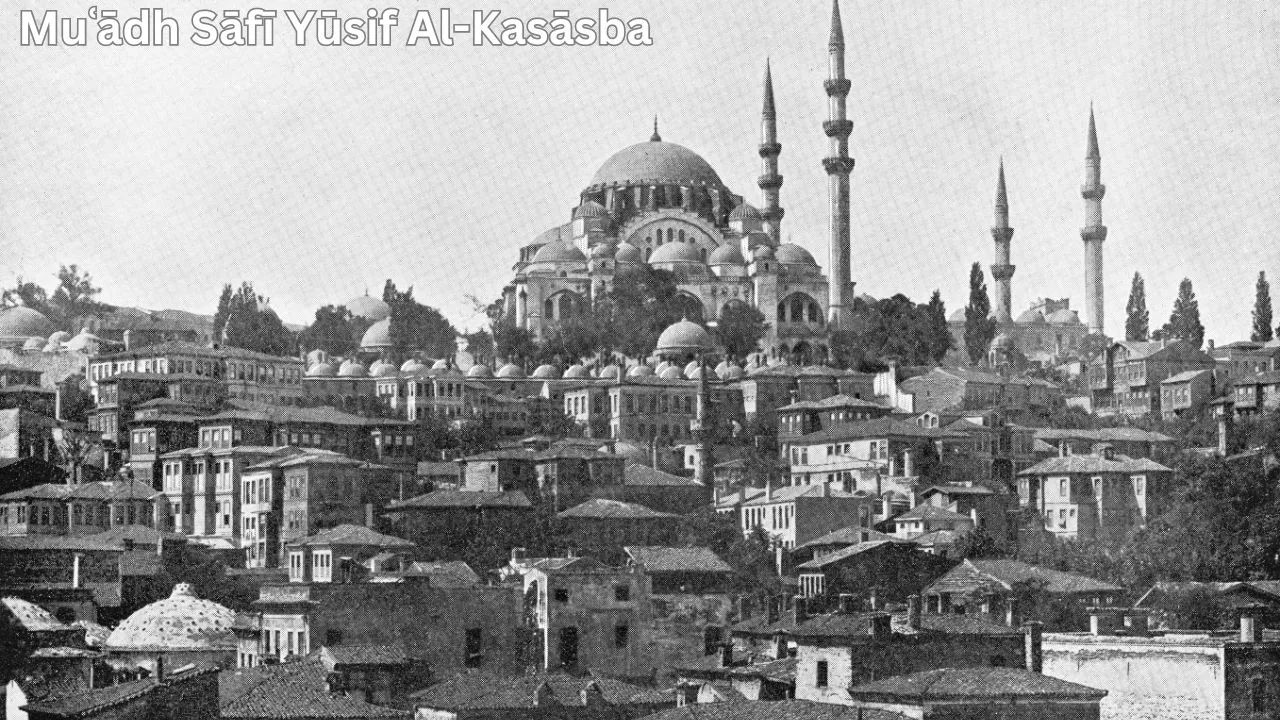In the vast ocean of history, countless figures leave their mark on the shores of time. Some rise like towering waves, their influence shaping the course of civilizations. Others, like hidden gems, rest beneath the surface, their brilliance waiting to be discovered. Muʿādh Sāfī Yūsif Al-Kasāsba, a revered Islamic scholar and educator, falls somewhere in between. But is his legacy a hidden gem waiting to be rediscovered, or a relic of the past with limited relevance in the modern world?
Unveiling the Enigma
Unfortunately, the sands of time have obscured some details about Muʿādh Sāfī Yūsif Al-Kasāsba’s early life. We lack a clear picture of his birthplace and upbringing. However, historical accounts suggest he emerged from a devout Muslim family, his heart ignited by a passion for religious knowledge from a young age. This thirst for wisdom propelled him into the vibrant world of Islamic scholarship during a period rich with intellectual and academic fervor. Imagine bustling madrasas (Islamic schools) echoing with scholarly debates, renowned centers of learning attracting students from across the Islamic world. This was the educational landscape that nurtured Al-Kasāsba’s intellectual growth.
A Life Dedicated to Learning
Muʿādh Sāfī Yūsif Al-Kasāsba’s dedication to scholarship transcended the walls of his local madrasa. Driven by an insatiable curiosity, he embarked on a journey of intellectual exploration, traveling to renowned Islamic centers. Imagine him traversing dusty roads, his eagerness to learn propelling him forward. He sought guidance from esteemed scholars, immersing himself in the rich tapestry of Islamic knowledge. This relentless pursuit of learning honed his expertise in various Islamic disciplines – jurisprudence, theology, and the intricacies of Quranic interpretation.
The Scholar’s Brilliance
Muʿādh Sāfī Yūsif Al-Kasāsba’s legacy extends far beyond his own intellectual achievements. He emerged as a prolific writer, leaving behind a treasure trove of influential works on Islamic jurisprudence, theology, and Quranic interpretation. These writings, lauded for their clarity, depth, and originality, continue to serve as valuable resources for contemporary Islamic scholars and students around the globe. Imagine his meticulous attention to detail, and his ability to translate complex theological concepts into clear and concise language. His dedication to the written word ensured his profound knowledge would continue to illuminate the path for future generations.
Beyond the written word, Al-Kasāsba’s brilliance extended to the realm of education. He wasn’t just a scholar, but also a passionate teacher who fostered intellectual inquiry and critical thinking among his students.
A Legacy in Question
Now, we return to the central question: Is Muʿādh Sāfī Yūsif Al-Kasāsba a hidden gem, his wisdom waiting to be rediscovered, or a relic of the past with limited relevance in the ever-evolving world?
Proponents of Al-Kasāsba’s continued relevance highlight the timeless nature of his teachings. The core principles of Islam – compassion, justice, and integrity – transcend time and geographical boundaries. His works offer a foundation in these core values, providing a framework for navigating the complexities of life in any era. Furthermore, his emphasis on critical thinking and intellectual inquiry aligns perfectly with the growing need for questioning and engaged Muslim scholarship.
However, some might argue that Al-Kasāsba’s views are outdated, reflecting the social and political context of his time. They might contend that his interpretations of Islamic law might not be readily applicable in the modern world.
Reevaluating the Gem
Let’s delve deeper. Is the mere fact that Al-Kasāsba existed in a different era enough to render his work irrelevant? The core principles of Islam remain constant, making his teachings valuable foundations. Imagine a skilled architect using blueprints from the past to construct a modern building. Similarly, Al-Kasāsba’s work provides a solid base upon which contemporary Islamic scholarship can build.
Furthermore, a closer examination reveals surprising resonances between Al-Kasāsba’s teachings and contemporary Islamic thought. His emphasis on ethical leadership, social responsibility, and intellectual inquiry continues to find echoes in the works of modern Islamic scholars. Imagine his voice joining a chorus of contemporary scholars, addressing the challenges faced by Muslims in the 21st century.
A Bridge Between Past and Present
In this light, Muʿādh Sāfī Yūsif Al-Kasāsba emerges not as a relic of the past, but as a bridge connecting traditional Islamic scholarship with contemporary practices. His legacy serves as a reminder of the rich tapestry of Islamic knowledge accumulated over centuries. By studying his work, we gain a deeper understanding of the historical context that shapes modern Islamic thought. Imagine traversing a vast bridge, one end rooted in the past and the other reaching towards the future. Al-Kasāsba’s legacy serves as that bridge, allowing us to connect the wisdom of the past with the challenges of the present.
Conclusion
The debate surrounding Muʿādh Sāfī Yūsif Al-Kasāsba’s relevance highlights the importance of engaging with historical figures. By studying their work, we not only gain valuable insights into the past but also enrich the present and pave the way for a more vibrant future of Islamic scholarship.
This exploration of Al-Kasāsba’s legacy is merely a starting point. His vast body of work awaits further study and interpretation. We encourage you to delve deeper, to explore his writings, and to discover the hidden gems of wisdom waiting to be unearthed. By engaging with the past, we ensure a richer and more informed future for Islamic scholarship.





